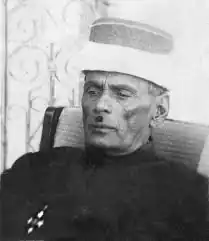Sayyid Abubakr bin Shaikh Al-Kaff
Sayyid Abubakr bin Shaikh Al-Kaff KBE (Arabic: أبو بكر بن شيخ الكاف; c. 1890–1965) was a Yemeni philanthropist known for assisting Harold Ingrams in pacifying Hadhramaut. He was also Councillor of the Kathiri State of Seiyun in the Aden Protectorate.[1]
Sayyid Abubakr bin Shaikh Al-Kaff | |
|---|---|
 | |
| Born | c. 1890 |
| Died | 1965 (aged 74–75) |
| Nationality | Yemeni |
| Known for | Pacifism and philanthropy |
Early life
Al-Kaff was born in Singapore around 1890 but would later move to Hadhramaut.[2] He was part of a sayyid family from Tarim who had become wealthy from real estate and trading in the Dutch East Indies and Singapore.[2]
Life

Al-Kaff helped to finance the construction of a road in Hadhramaut from the interior to the coast which included compensating local tribesmen for the loss of earnings from their camel trains due to the rise of motor vehicles.[2] Ingrams wrote that he had started building the road about ten years prior to his arrival and that the cost of compensations was $180,000.[3] He also commented that the little knowledge Al-Kaf's foreman Ubeid had was dangerous as he never knew when a task was impossible and thought motor-cars could go up anything like flies.[3] Al-Kaff was also involved in providing free education and medical care to the people of Tarim by maintaining a school and hospital.[2]
In 1936, Al-Kaff assisted British colonial administrator Harold Ingrams in brokering a three year truce between warring Qu'aiti and Kathiri tribes.[2] Ingrams mentions him in his 1942 book Arabia and the Isles in which he describes Al-Kaf as being "in a class by himself, but, although his holy descent no doubt increased his influence, his claim to fame rests rather on his own personality and character".[4] He added that they "were total allies and he played no part with the general body of Seiyids who had a traditional vested interest in the continuation of feuds".[4] Ingrams noted that he could be an embarrassment due to his desire for Hadhramaut to be ruled by the British like Singapore but that Al-Kaf accepted that he "would not play that way".[4]
In 1938, he was appointed Commander of the Most Excellent Order of the British Empire for his public services and in 1953 he was promoted to Knight Commander.[2] In April 1954, Queen Elizabeth II formally knighted him in Aden's first and only knighthood ceremony as part of her visit to the colony.[5] He was knighted whilst kneeling on a chair instead of bowing due to his Muslim faith.[6]
References
- The Illustrated London News 1954, p. 753.
- Ducker, John (August 2003). "In Memoriam: Sayyid Abubakr bin Shaikh Al-Kaff KBE". The British-Yemeni Society. Archived from the original on 27 May 2023.
- Ingrams 1942, p. 231.
- Ingrams 1942, p. 19.
- Al-Shamahi, Abubakr (9 September 2022). "Queen Elizabeth II's last foothold in Arabia". Al Jazeera. Archived from the original on 26 May 2023.
- Noman, Alaa; Magdy, Samy (17 September 2022). "In Yemen, Queen Elizabeth's death recalls memories of Britain's colonial rule". PBS NewsHour. Archived from the original on 26 May 2023.
Sources
- Ingrams, Harold (1942). Arabia and the Isles. ISBN 9781136170447. Retrieved 28 May 2023.
- The Illustrated London News (1954). The Illustrated London News, Volume 224. Retrieved 28 May 2023.